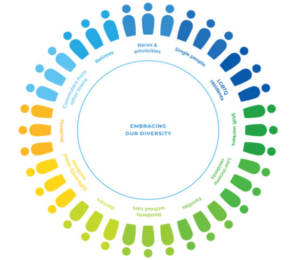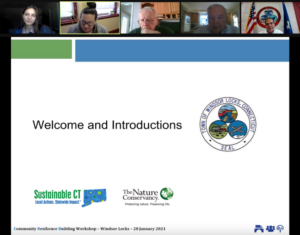As climate change races its way up the agenda in both micro- and macropolitics, leaders and organizers at all scales are coming up with pathways for addressing it through mitigation and adaptation. Across the nation, municipalities are joining regional networks that address the local challenges of climate change by applying for points-based municipal certification programs. These programs foster local sustainable development, the creation of sustainability teams, committees, and task forces, and the drafting of comprehensive climate action plans to conquer environmental crises at the local level. 
Through the Summer and Fall of 2020 and, to my great surprise, the Winter of this year, I’ve had the privilege of bolstering these local efforts through my internship with Sustainable CT: a nonprofit organization run out of the Institute for Sustainable Energy at Eastern Connecticut State University. Sustainable CT is a voluntary municipal certification program that recognizes thriving, inclusive, and resilient Connecticut municipalities. An independently funded and fully grassroots effort crafted by towns, for towns, Sustainable CT provides a wide-ranging menu of best practices in the form of step-by-step actions that towns may choose from based on their unique capacities and resources in order to earn points toward certification. Through its Community Match Fund, Sustainable CT also grants donation-matching funds to towns across the state implementing inspiring, sustainability-fostering projects.
 To achieve either Bronze or Silver certification, municipalities must complete at least one action in 11 mandatory (13 total) action categories–all of which represent a different facet of sustainable development. Towns must obtain at least 200 and 400 points for Bronze and Silver, respectively, with the common denominator being the mandatory completion of Equity Toolkits that must be applied to actions within the program.
To achieve either Bronze or Silver certification, municipalities must complete at least one action in 11 mandatory (13 total) action categories–all of which represent a different facet of sustainable development. Towns must obtain at least 200 and 400 points for Bronze and Silver, respectively, with the common denominator being the mandatory completion of Equity Toolkits that must be applied to actions within the program.
In my time with Sustainable CT, I have supported the development of actions both through providing meaningful revisions to existing actions and writing entirely new ones, all while engaging with town officials, local and national stakeholders alike, and well-renowned environmental professionals. In addition to assisting with action development and the launch of a ‘new’ program release for 2021, I have also supported the certification process and helped lead regional and statewide webinars on issues ranging from complete streets to homelessness prevention.
From Campus to Connecticut
Through my experience in Bard’s Center for Environmental Policy (BCEP), I came into Sustainable CT with a broad definition of sustainability to match the organization’s. The comprehensive curricula that BCEP provides prepared me to engage in systems thinking in terms of seeing all aspects of sustainability as inextricably linked: environment, economy, equity, community, health, culture, housing, food, and everything in between. Having an expansive foundation of systems thinking-based curricula and practice alike through my first year at BCEP prepared me to dive right into the work of an organization whose work is founded on interconnectedness and multisolving.
A critical piece of my BCEP curricula that translated into my work with Sustainable CT is the foundation of knowledge gained through my first year Environmental Policy classes with Professor Monique Segarra. The integration of lessons on stakeholder engagement, social networks and social movements theories, and the broad lens through which our class would discuss sustainable livelihoods prepared me with knowledge of the policy legacies that continue to hinder sustainable development at micro and macro scales.
Both through the passion I derived from my work with Sustainable CT and from Professor Segarra’s countering of traditional sustainability thinking by explicitly linking sustainability and livelihoods, I am now constructing a thesis that links housing segregation to environmental racism in the urban landscape to obtain my degree, all while working on-the-ground with organizations in Connecticut on housing desegregation efforts.
California Girl Dreamin’
The opportunity to work within an organization that has been recognized with awards by the Environmental Protection Agency (amongst others) alone is the unexpected dream of a lifetime, much less the opportunity to contribute to its content and organization.
Thinking back to a year ago when I was applying for internships, I knew so little about what was to come–that not only would I be affecting change through writing actions and helping to certify towns, but that I would be seeing this change occur in my own lifetime.
From working with Yale students on statewide zoning reform, to co-facilitating Community Resilience Building workshops with The Nature Conservancy, to writing weekly newsletters distributed statewide, to helping trailblaze a multi-organizational homelessness prevention initiative, I simply could never have pictured this beach-dwelling, Grateful Dead-loving California girl affecting real change, real justice on a coast that I had never travelled to. I could be wrong, but I may just be the absolute luckiest person to have ever gone through this graduate program. I found my passion; the light that I had always seen in my periphery but had not yet reached.


